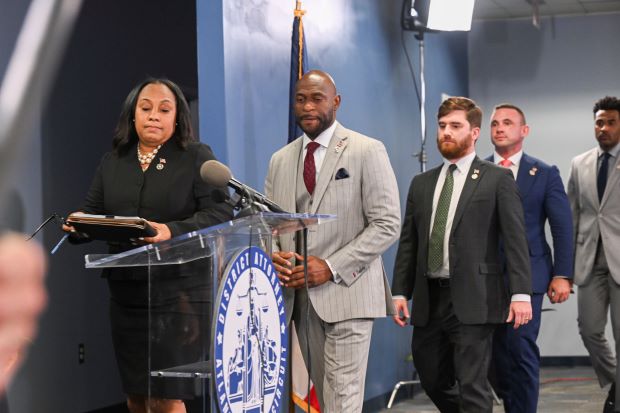Trump indicted for racketeering in 2020 election interference case in Georgia

By Richard Fausset and Danny Hakim
ATLANTA – Former President Donald Trump and 18 others, including some of his former lawyers and top aides, have been indicted by an Atlanta grand jury in a sweeping racketeering case focused on Trump’s efforts to reverse the results of the 2020 election in Georgia.
The indictment — handed up after a single, extra-long day of testimony — is an unprecedented challenge of presidential misconduct by a local prosecutor.
It brings charges against some of his most prominent advisers, including Rudy Giuliani, his former personal lawyer, and Mark Meadows, who served as White House chief of staff at the time of the election.
“Trump and the other Defendants charged in this Indictment refused to accept that Trump lost, and they knowingly and wilfully joined a conspiracy to unlawfully change the outcome of the election in favour of Trump,” prosecutors wrote in the indictment.
Trump, running again for president and the early favourite to win the Republican nomination, has now been indicted in four separate criminal investigations since April, including a federal indictment earlier this month over his attempts to cling to power after losing the 2020 race.
Although that case covers some of the same ground as the one in Georgia, there are crucial differences between state and federal charges: Even if Trump were to regain the presidency, the prosecutors in Georgia would not report to him, nor would he have the power to attempt to pardon himself if convicted.
Here’s what to know:
— The indictment laid out eight ways the defendants obstructed the election: by lying to the Georgia state Legislature, by lying to state officials, by creating fake pro-Trump electors, by harassing election workers, by soliciting Justice Department officials, by soliciting Vice President Mike Pence, by breaching voting machines and by engaging in a cover-up.
— The investigation was led by Fani Willis, the Fulton County district attorney. It focused on five actions taken by Trump or his allies in the weeks after Election Day, when Joe Biden narrowly won Georgia. Those actions include phone calls that Trump made to pressure state officials to overturn the result, as well as harassment of local election workers by Trump supporters, false claims of ballot fraud, a plan by Trump allies to create a slate of bogus electors and a data breach at an elections office in rural Coffee County, Georgia.
— A statement from the Trump campaign accused Willis of being a “rabid partisan” and said her election interference investigation was based on “fabricated accusations.” The campaign tied the investigation to the Biden administration, despite the fact that it came from a state prosecutor.
— Kenneth Chesebro and John Eastman, architects of the plan to use fake Trump electors to circumvent the popular vote in a number of swing states, were among a number of lawyers who advised Trump who were indicted. So was Mike Roman, a former Trump campaign aide who helped coordinate the elector scheme.
— Jeffrey Clark, a former senior official in the Department of Justice who embraced false claims about the election and tried to embroil the department in challenging the Georgia vote, was also indicted. Other lawyers who aided Trump’s efforts who were indicted include Sidney Powell and Jenna Ellis.
— A number of Georgia Republicans were also indicted, including David Shafer, the former head of the state party, and Shawn Still, a state senator. Cathy Latham, a party leader in a rural county who served as one of the bogus Trump electors, was also indicted.
— All 19 defendants are being charged under Georgia’s racketeering statute, and each of them has at least one additional charge. Racketeering laws are often used to prosecute people involved in patterns of illegal activity, and can be useful in targeting both foot soldiers and leaders in a corrupt organization.
— Lesser-known defendants named in the sprawling indictment flesh out the picture of the multi-faceted and at times bizarre efforts that pro-Trump forces undertook in Georgia. Among them are three people alleged to be involved in an effort to to pressure a rank-and-file election worker in Fulton County to falsely admit that she committed fraud on Election Day in 2020. Central to that effort, prosecutors say, was Trevian Kutti, a celebrity stylist from Chicago and Trump supporter who persuaded the worker, Ruby Freeman, to meet with her in early January 2021.
— Trump has also been charged by the special counsel overseeing the federal investigations, Jack Smith, with mishandling classified documents, and by prosecutors in New York in connection with money paid to an adult-film actress who was poised during the 2016 campaign to go public with her story of a sexual encounter with him.
— Trump has denied all of the charges against him, claiming they are part of a politically motivated “witch hunt” intended to keep him from being elected again next year. His hope of avoiding criminal convictions in the federal cases may hinge largely on his presidential campaign — he could theoretically pardon himself for federal crimes if re-elected.
-New York Times


Comments are closed, but trackbacks and pingbacks are open.